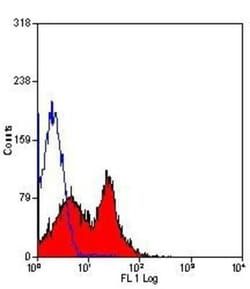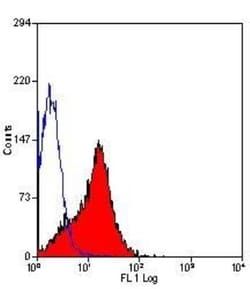LAG-3 Antibody (C9B7W), FITC, Novus Biologicals™
Manufacturer: Novus Biologicals
Select a Size
| Pack Size | SKU | Availability | Price |
|---|---|---|---|
| Each of 1 | NB10063601F-Each-of-1 | In Stock | ₹ 54,290.00 |
NB10063601F - Each of 1
In Stock
Quantity
1
Base Price: ₹ 54,290.00
GST (18%): ₹ 9,772.20
Total Price: ₹ 64,062.20
Antigen
LAG-3
Classification
Monoclonal
Conjugate
FITC
Formulation
PBS with 0.05% Sodium Azide
Gene Symbols
LAG3
Immunogen
Murine CD223 Ig fusion protein
Quantity
0.125 mL
Research Discipline
Adaptive Immunity, Immunology, Innate Immunity
Gene ID (Entrez)
3902
Target Species
Mouse
Form
Purified
Applications
Flow Cytometry
Clone
C9B7W
Dilution
Flow Cytometry
Gene Alias
CD223, CD223 antigen, FDC, LAG-3, lymphocyte activation gene 3 protein, lymphocyte-activation gene 3, Protein FDC
Host Species
Rat
Purification Method
Protein G purified
Regulatory Status
RUO
Primary or Secondary
Primary
Test Specificity
NB100-63601 recognizes murine lymphocyte activation gene-3 (LAG-3), a 70kD activation-induced cell surface molecule that is also referred to as CD223. Murine CD223 is expressed on activated CD4 positive and CD8 positive alpha/beta T lymphocytes and a subset of natural killer (NK) cells. CD223 binds to MHC class II molecules with high affinity and is reported to negatively regulate T cell homeostasis and T cell expansion. Clone C9B7W recognizes an epitope within the D2 domain of CD223. The antibody is reported to block the in vitro function of murine LAG-3 but studies suggest that the antibody does not block binding of LAG-3 to MHC class II (1). 1. Workman, C.J. et al. (2002) Phenotypic analysis of the murine CD4-related glycoprotein, CD223 (LAG-3). Eur J Immunol. 32 (8): 2255-63
Content And Storage
Store at 4C in the dark.
Isotype
IgG1
Description
- Description LAG-3 Monoclonal specifically detects LAG-3 in Mouse samples
- It is validated for Flow Cytometry.


